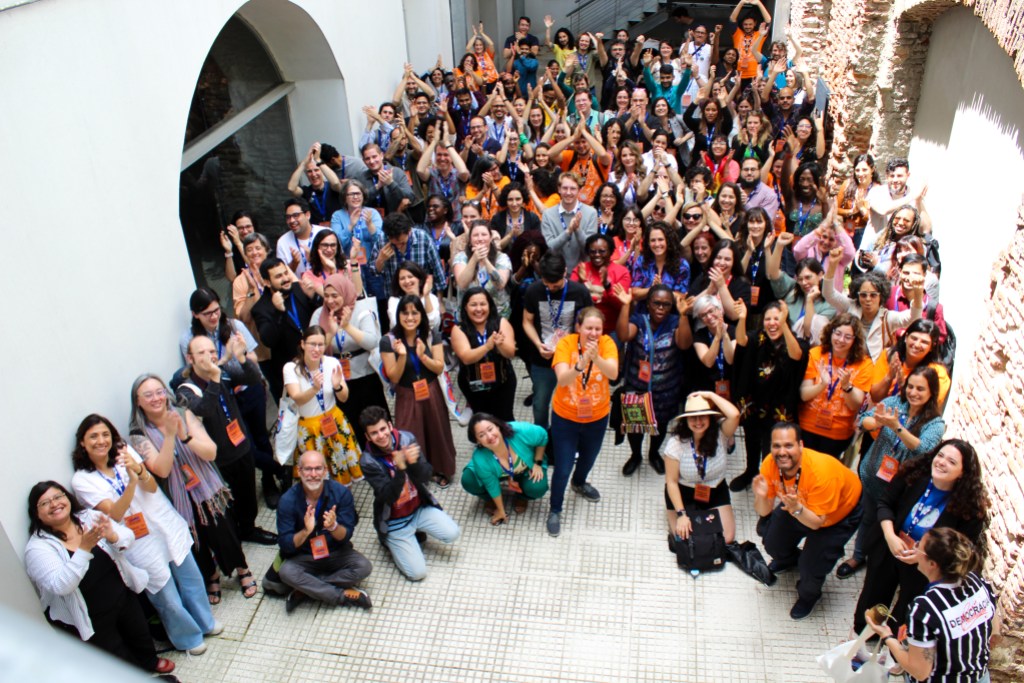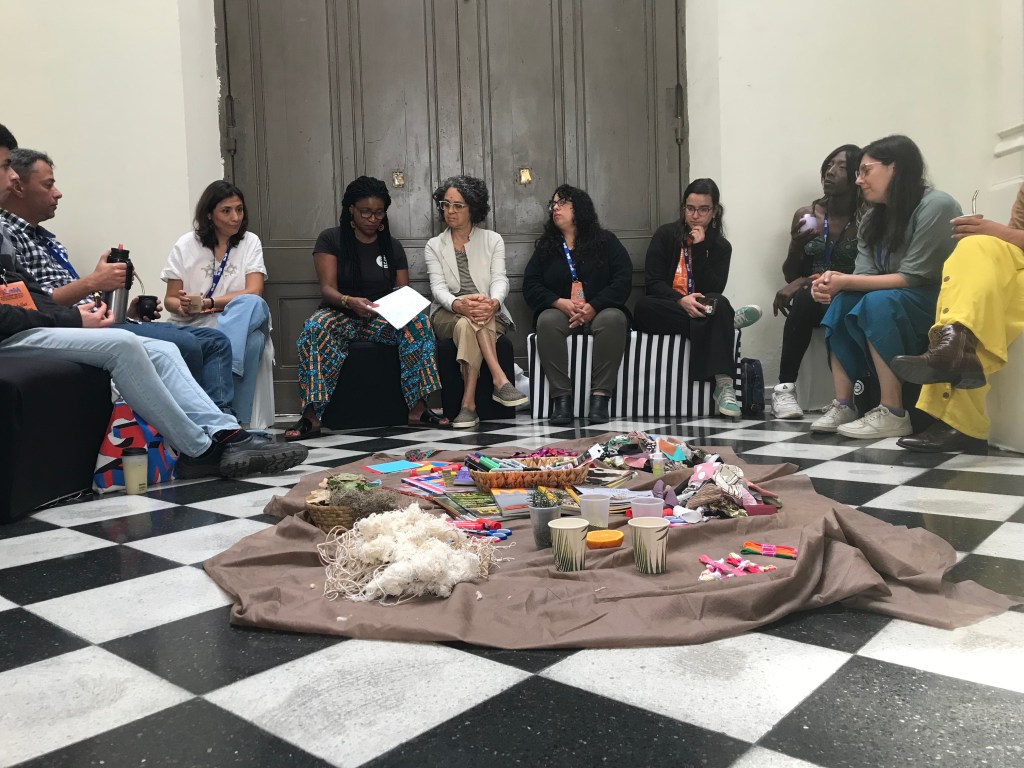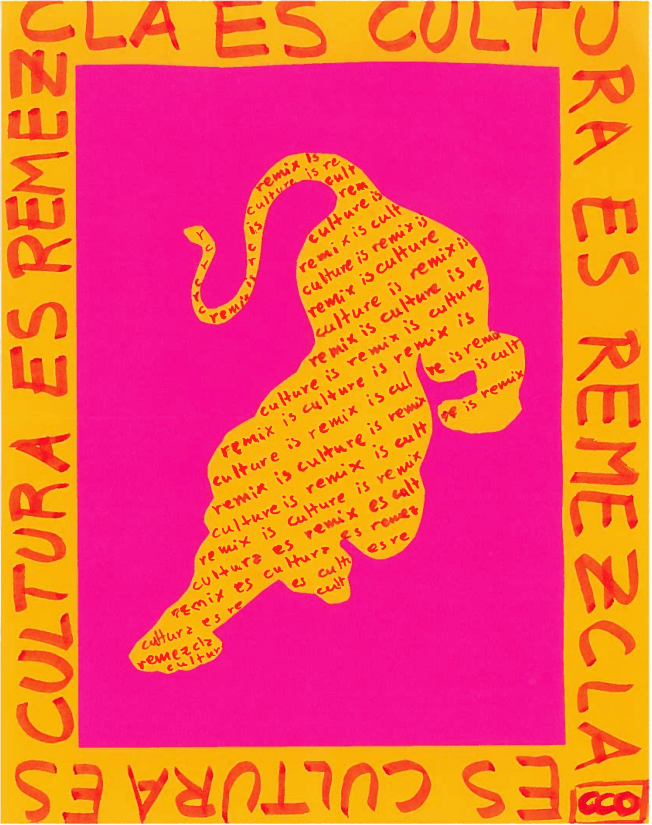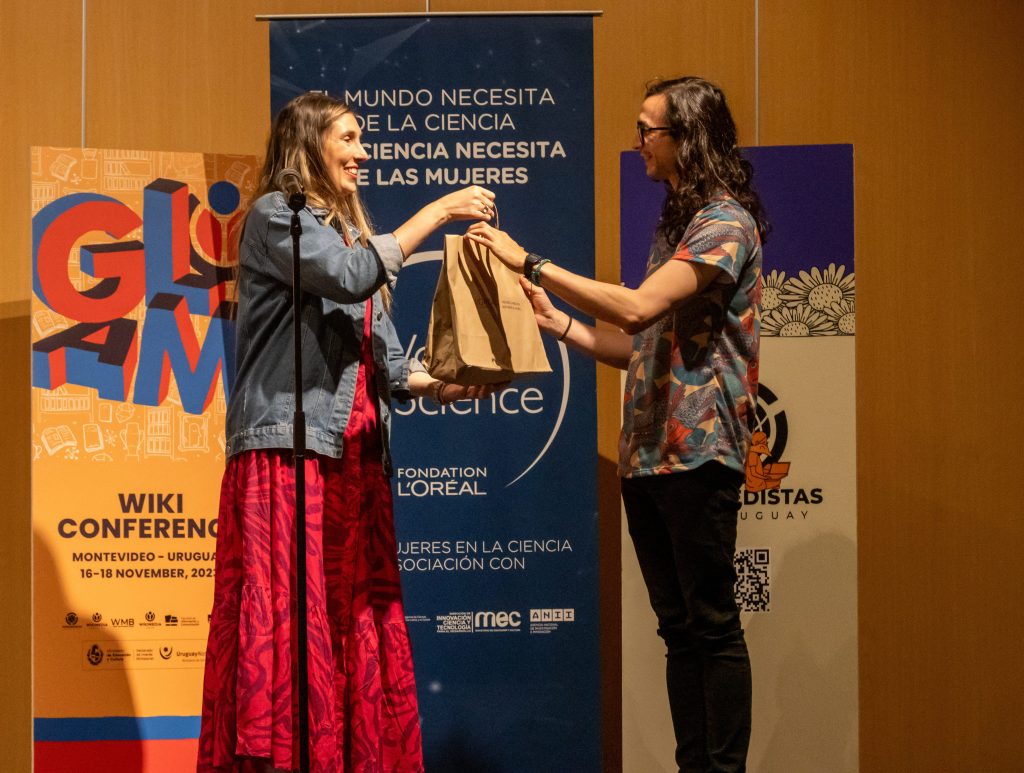
After a wait of more than five years, the global GLAM Wiki community finally met again; this time in Montevideo, Uruguay, in the beautiful building of the Facultad de Información y Comunicación of the University of the Republic (UdelaR). The event was organized by Wikimedistas de Uruguay with planning support from Wikimedia Argentina, Wikimedia Chile, and Wiki Movimento Brasil, and volunteer committees guiding scholarship and program decisions.
The conference had more than 50 sessions that engaged around 150 participants who came from all over the world, with representatives from cultural and heritage organizations, as well as chapters, and regional and thematic groups. The conference was also supported by the Uruguayan government with a declaration of interest from the Ministry of Culture & Education and from the Ministry of Tourism. The event was held in the context of the “Data Marathon”, led by the Agencia de Gobierno Electrónico y Sociedad de la Información y del Conocimiento (AGESIC).
To ensure equitable access to the conference, more than 50 participants received scholarships, which were awarded by a committee of volunteers, with support and advice from the conference’s steering committee. Sixty per cent of scholarship recipients were women and more than 80% came from Latin America, Africa, and Asia. The visa process went well and only one scholarship recipient was not able to make it to the conference, which is an exceptional result for a global Wikimedia conference!
The conference organizers centered inclusion in other ways, too. Even though it was a global conference, with participants from all over the world, English was not the default language. Rather, the most spoken languages at the conference, at least from the main stage, were Spanish and Portuguese. Wikimedistas de Uruguay ensured that the live interpretation in three languages—Spanish, English, and Portuguese—was available in the auditorium at all times. The system worked well and conference attendees reflected that it was good to hear people presenting in their own languages. Wikimedistas de Uruguay also streamed live from the auditorium and you can access the recordings on their YouTube channel, in Spanish, Portuguese, and English.
Latin American affiliates had a strong presence at the conference. There was a pre-conference event, which took place in the Legislative Palace of Montevideo, for LATAM attendees to reflect on the current state of GLAM Wiki initiatives in the region and strategize together. The main conference was attended by Executive Directors and several staff members from not only the organizing affiliates Wikimedistas de Uruguay, Wikimedia Argentina, Wikimedia Chile, and Wiki Movimento Brasil but also Wikimedia México, Wikimedia Colombia, Wikimedistas de Bolivia, and WikiAcción Perú. To conclude the pre-conference event, there was an open panel on “AI and the Knowledge Society”. The discussion featured Selena Deckelmann, CTO of the Wikimedia Foundation, Patricia Díaz Charquero, Director of Datysoc, as well as Maximiliano Maneiro, Manager of New Technologies at AGESIC. The panel was supported by AGESIC, the Working Group on Digital Citizenship, and the Palacio Legislativo de Montevideo.
Many attendees reflected that the conference successfully combined global participation with a strong sense of regional energy and collaboration. Communities and partners from Latin America brought a distinctive perspective to discussions of culture and heritage, centering human rights, climate action, underrepresented heritage, community archives, and indigenous knowledge. For instance, the Unconventional uses of Wikimedia projects session included a presentation by Carlo Brescia, from WikiAcción Perú, about documenting ‘master plants’ and rituals for health in indigenous communities, as well as a talk by Patricia Díaz Rubio, from Wikimedia Chile, about sharing the images of political protests and police violence that can be censored on commercial platforms. In the Cultural heritage and the Wikimedia movement in times of crisis session, João Peschanski, from Wiki Movimento Brasil, talked about Wikimedians as whistleblowers for cultural heritage protection.
One of the highlights of the conference was the Wiki Cultura: Open Digital Transformation for Latin American Collections panel, which gathered representatives from several GLAM institutions in Latin America: Gabriel García Martínez from the Centro de Fotografía de Montevideo, Marcus Vinícius from the Fundação Oswaldo Cruz, Laura Casareto from the Archivo Histórico de la Universidad Nacional de La Plata, Meica Valdivia from the Museo Nacional de Historia Natural, and Felipe Bengoa from Enterreno.com. These GLAM professionals talked about similarities between their mission and that of the Wikimedia movement, such as facilitating public access to information, connecting data sources, and addressing misinformation. Many of the presenters were just at the start of their collaboration with the Wikimedia movement and they reflected that there is a lot of work they need to do first to digitize and research their collections. While there are some national policies for open access, there is still a lot of uncertainty at the institutional level for GLAM staff who want to open up their collections. The presenters were interested in working further with the Wikimedia movement to raise awareness of the barriers to open access and the need for copyright exceptions.

Alongside the panels and presentations, there were creative workshops, including a call for collective activation to decolonize memory, Reivindicando nuestras voces en los proyectos GLAM Wiki: una activación colectiva para descolonizar la memoria. In this session, participants created a mosaic of their own significant objects, showing they were there not only to talk about the preservation and dissemination of heritage, but also to share their own experiences from many different places in the world, and to make new memories. This artistic intervention was temporarily installed at Tribu, a cultural space, and shared during the closing session, alongside open culture remix posters from a workshop facilitated by Creative Commons, and a dragon fanzine and spoken word manifesto presented by Nicole González Herrera (Subdirección Nacional de Museos, Chile).

In parallel with the in-person schedule, the conference featured an online program. The remote sessions took place over four days and included presentations about gender and country biases in Wikipedia citations to scholarly publications (part of the WMF Research Showcase); a project that is making Brazilian classical music scores available; and an initiative that is unveiling the cultural tapestry of Tanzania. The online program also had sessions that could be watched anytime, such as one about the Wikiproyecto Chiloé, an open-access experience with the historical heritage of Southern Chile. It was also possible for remote attendees to take part in the Latin America in Wikidata challenge, a contest that improved information about Latin American authors using the Wikidata Distributed Game.
As you would expect, the conference also featured an opportunity to edit. Edit-a-thon “Women in sciences”, sponsored by L’Oréal Groupe, invited both in-person and online conference attendees to improve and translate the biographies of women from Latin America who have won the L’Oréal-UNESCO award in their countries.

The pre-conference survey identified that there was a need for the conference to explore both the social and technical approaches we typically see in GLAM Wiki initiatives. In the lead-up to the conference, the community was supported to have a series of online conversations, where they shifted from talking about small but urgent needs to wanting to co-design a shared infrastructure that will last. The conference organizers also invited the Wikimedia Foundation’s Chief Product and Technology Officer, Selena Deckelmann, to speak at one of the online sessions, AI and the Knowledge Society, and give a keynote in person in Uruguay, where Selena asked the community how we can make Wikipedia a multigenerational project.
We want to thank the Wikimedistas de Uruguay team (Evelin Heidel, Isaac Ilovaca, Paula Domínguez Font, Natalia Hernández Silveira, Nat Hernández Clavijo, Federico Colman, and Gonzalo Saavedra), the core organizing team (including Anna Torres, Patricia Diaz, and Sandra Soster), and the program and scholarships committees for all of their work to make the conference such a diverse, inclusive, and dynamic event. Finally, we want to express our gratitude to the Facultad de Información y Comunicación of the University of the Republic of Uruguay, not only for the space but also for all of their support to make GLAM Wiki 2023 happen. The impact of this conference will be felt for years to come and wouldn’t have been possible without the incredible efforts of everyone involved.

Can you help us translate this article?
In order for this article to reach as many people as possible we would like your help. Can you translate this article to get the message out?
Start translation